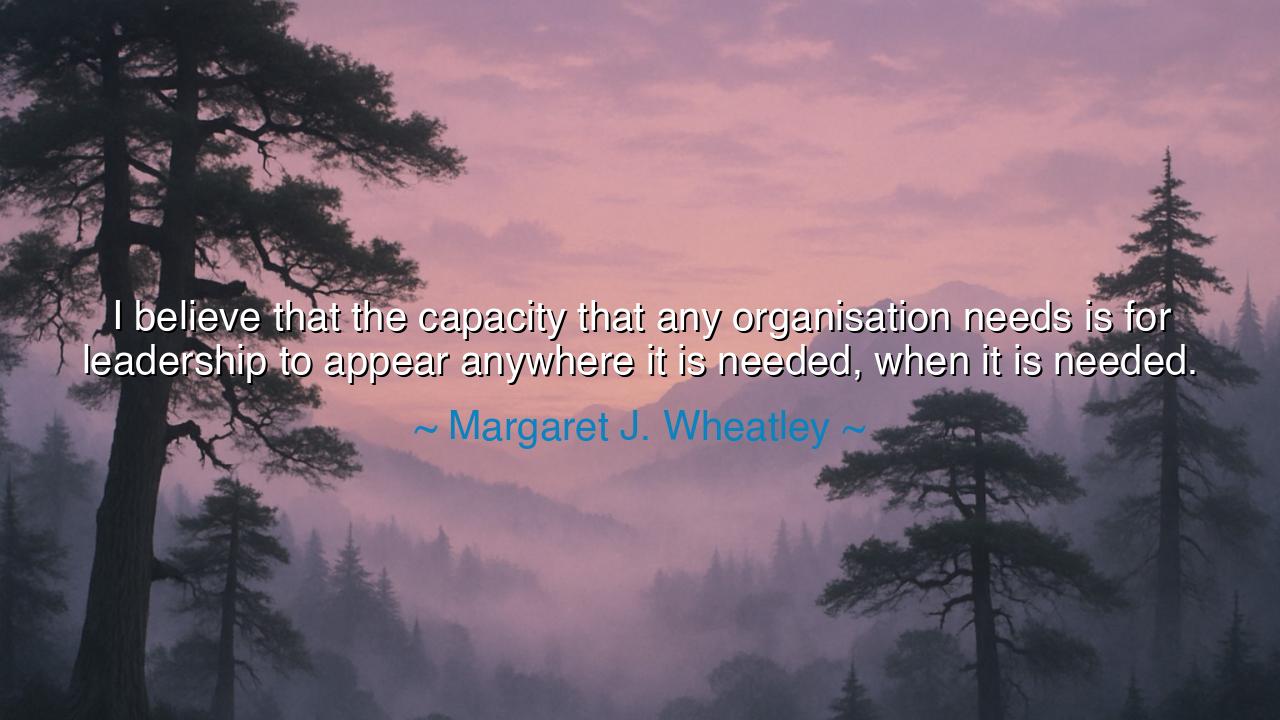
I believe that the capacity that any organisation needs is for
I believe that the capacity that any organisation needs is for leadership to appear anywhere it is needed, when it is needed.






In the timeless wisdom of Margaret J. Wheatley, we hear the voice of a thinker who understood that leadership is not the crown of a few, but the calling of the many. When she said, “I believe that the capacity that any organisation needs is for leadership to appear anywhere it is needed, when it is needed,” she was not merely describing a structure of management — she was describing the lifeblood of a living system. Her words shimmer with the truth that every community, every organization, and every nation thrives not when authority is concentrated, but when leadership arises organically, like light breaking through the cracks of necessity. In this vision, leadership is not a title, but a spirit that moves where it must, through whomever has the courage to rise.
Margaret Wheatley, a scholar and organizational theorist of the late twentieth century, became known for weaving the language of science, spirituality, and human systems into a philosophy of renewal. In an age when corporations sought rigid control, she spoke of self-organizing systems and the natural intelligence of people working in harmony. Her insight into leadership arose from observing how order can emerge from chaos — how, when trust and purpose are shared, leadership can arise from any corner, as naturally as a flame kindled in darkness. This was her rebellion against the cold machinery of hierarchy: she saw leadership not as command, but as consciousness — a readiness to act when the moment calls, regardless of position or power.
In truth, her words reflect a pattern as old as the stars. The ancients saw the same truth written in the stories of their heroes. When Athens stood trembling before the Persian invasion, it was not kings but citizens — rowers, soldiers, thinkers — who rose to lead in their own ways. When the walls of Troy fell, it was not by one commander’s will, but through the cunning, courage, and sacrifice of many. And in every great civilization, the lesson repeats: when leadership is confined to the few, it stagnates; when it flows freely among the many, it renews the world. For leadership is not a throne — it is a torch, and its light must be carried by all willing hands.
History gives us countless mirrors of Wheatley’s vision. Consider the story of Ernest Shackleton, the Antarctic explorer whose expedition met disaster when his ship, the Endurance, was crushed by ice. Stranded in the frozen wilderness, his men faced death. Shackleton led with unbreakable courage, but what saved them was not his leadership alone — it was the way his spirit awakened leadership in others. The cook became a morale builder, the carpenter a strategist, the sailors each took turns making decisions to protect one another. In that frozen desolation, leadership appeared everywhere it was needed, and because it did, every man survived. Shackleton’s story is the living proof of Wheatley’s belief: that in the moments that define us, leadership must be shared, responsive, and alive.
The meaning of Wheatley’s words goes beyond organizations — it speaks to the fabric of community and the destiny of humankind. In every household, in every village, in every age, there are moments when someone must step forward — to heal, to guide, to stand. True leadership is not born from hierarchy but from awareness — the ability to see what must be done and the courage to do it. When leadership becomes everyone’s responsibility, the world becomes resilient. When it is hoarded, the world weakens. Wheatley calls us to cultivate not dependency, but capacity — the readiness in every soul to serve when the call arises.
There is also a quiet humility in her vision. For Wheatley teaches us that leadership is not domination, but service; not glory, but grace. It does not demand recognition, only action. In times of peace, it may appear as a kind word; in times of crisis, as a bold decision. Like water, it takes the shape of the vessel it fills. The wise leader, then, is one who makes space for others to lead, who tends the soil so that courage and responsibility can grow in many hearts. To lead in this way is not to command the world, but to awaken it.
The lesson we draw from her teaching is one of empowerment and stewardship. Do not wait for titles, positions, or permission to lead. Where there is confusion, bring clarity. Where there is fear, bring steadiness. Where there is silence, bring voice. Let leadership arise in you and through you, not as pride, but as purpose. And when you see leadership in others, nurture it, for that is how a living system sustains itself — through shared strength and mutual awakening.
So remember, as Wheatley taught, that the capacity for leadership is the breath of every community. Do not let it sleep in you. Let it rise when the time calls — whether in the marketplace or the home, in the council or the field. For when leadership appears wherever and whenever it is needed, the world moves closer to harmony. And when it is absent, even the strongest structures crumble. Therefore, be ready, be present, and when the moment comes, lead — not for power, but for life.






AAdministratorAdministrator
Welcome, honored guests. Please leave a comment, we will respond soon